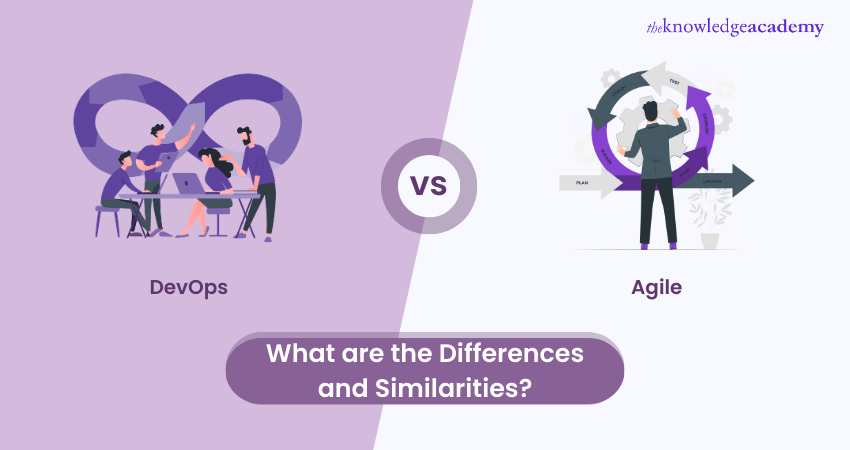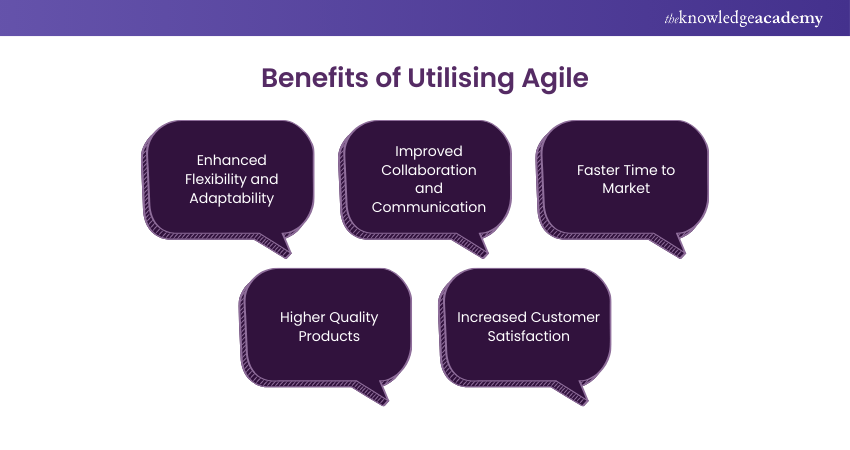We may not have the course you’re looking for. If you enquire or give us a call on +918037244591 and speak to our training experts, we may still be able to help with your training requirements.
We ensure quality, budget-alignment, and timely delivery by our expert instructors.

Picture a development team grappling with the challenge of delivering high-quality software on a tight schedule. They decide to explore new methodologies and come across two popular choices: DevOps vs Agile. But which path should they take?
In this blog, we dive into the fascinating debate of "DevOps vs Agile" to highlight their differences and similarities. Have you ever questioned how these methodologies can revolutionise your development process? Or why some teams are devoted to Agile while others are staunch supporters of DevOps?
By exploring certain differences and similarities, we aim to address these questions and more. Read ahead to uncover the unique advantages and challenges of each approach and learn how they can complement each other to foster innovation and efficiency in your projects.
Table of Contents
1) What is DevOps?
2) What is Agile?
3) DevOps vs Agile
a) DevOps vs Agile: How are DevOps and Agile Different?
b) DevOps vs Agile: How are Agile and DevOps Similar?
4) Challenges in Combining DevOps and Agile
5) Conclusion
What is DevOps?
DevOps is a Software Development method, which permits teams to create, test, and deploy software more quickly and consistently by implementing Agile concepts and practices, such as enhanced automation and more communication between development and operations teams, it can also be termed as DevOps services.
DevOps aims to bridge the gap between operations, who manage the software in production, and developers, who create application software, to build and operate the supporting infrastructure. The obsolete method of building applications by development teams and handing them off to an operations team to deploy and maintain the software with little understanding of how it was created has been replaced by DevOps.
Since 2009, a lot has changed in the software development business, yet the pillars of What is DevOps remain, and those include the following:
a) Cooperation and trust between the Dev and Ops teams
b) Significant reliance on comprehensive software testing procedures
c) Contemporary tool integration to streamline development and operation activities.
What is Agile?
Agile is an iterative software development and project management approach that emphasises teamwork, client feedback, and quick releases. It emerged from the software development sector in the early 2000s, assisting teams in responding to evolving market conditions and client demands.
An Agile approach incorporates some upfront strategy and design, but the development is done in short cycles and with solid stakeholder collaboration. Continual changes are made, and useable versions of products are frequently published more rapidly than those created using the waterfall process.

Numerous advantages result from this. The most significant is probably the ability to immediately fix software that doesn't match the demands or expectations of the user.
The four core values of Agile software development are highlighted below:
1) Working software is preferred over thorough documentation
2) Responded by switching over in accordance with a plan
3) Collaboration with the customer during contract negotiations
4) Discussion of the method and tools amongst individuals and teams
Manage projects with Agility and precision – register for our Agile Project Management Foundation & Practitioner (Agile PM®) Course.
DevOps vs Agile
The core idea of Agile is to add agility to development. But delivering agility to both development and operations is the core idea behind DevOps. The most crucial aspect to keep in mind is that DevOps does not replace Agile. But it indeed is an advancement and a natural replacement for the Waterfall methodology and other Scrum principles.
The obstacles associated with Agile have developed over time, much like how practices improve with time, and DevOps has emerged as the more effective method.
Embark on your DevOps journey with confidence – join our DevOps Foundation Certification.
a) DevOps vs Agile: How are Agile and DevOps Different?

b) DevOps vs Agile: How are Agile and DevOps Similar?
The fundamental distinctions between the Agile and DevOps methodologies have been covered in detail. Let's concentrate on their similarities and determine their relationship to one another:
1) Both Increase Business Productivity: Although Agile and DevOps may take distinct approaches, they are both working toward the same objective, which is to increase corporate efficiency.
Both methods for developing software are incredibly reliable. DevOps accelerates Agile's work, and Agile pushes DevOps to be more intensive.
2) Using Lean Philosophies: The Lean idea has been extensively accepted and applied in both Agile and DevOps. This is noticeable, particularly in the communication.
3) The Collaboration Process: Another area where Agile and DevOps share objectives is with subsequent collaboration. The team needs to work together, regardless of the method they use. Every team must further communicate updates on the development process.
Be the catalyst for continuous improvement – register for our DevOps Leader Certification now!
Challenges in Combining DevOps and Agile
Integrating DevOps and Agile Methodologies can be highly beneficial, but it also presents several challenges including:
a) Cultural Differences: Agile focuses on iterative development and customer feedback, while DevOps emphasises continuous delivery and operational stability. Aligning these cultures requires significant effort and change management.
b) Tool Integration: Both methodologies rely on different sets of tools. Ensuring seamless integration between development, testing, and deployment tools can be complex and time-consuming.
c) Skill Gaps: Teams may lack the necessary skills to effectively implement both methodologies. Continuous training and upskilling are essential to bridge these gaps.
d) Communication Barriers: Effective communication is crucial for the success of both Agile and DevOps. Miscommunication between development and operations teams can lead to delays and inefficiencies.
e) Balancing Speed and Quality: Agile promotes rapid development cycles, while DevOps focuses on stability and reliability. Finding the right balance between speed and quality can be challenging.
f) Resistance to Change: Implementing DevOps and Agile requires a shift in mindset and processes. Resistance from team members who are accustomed to traditional methods can hinder progress.
Confused about automation strategies? Explore the key differences in Continuous Delivery vs Continuous Deployment!
Conclusion
In summary, grasping the intricacies of "DevOps vs Agile" can revolutionise your development approach. Whether you lean towards DevOps, Agile, or a hybrid model, the secret lies in adapting to your team's dynamics and project demands. Ready to elevate your workflow? The decision is in your hands.
Understand how to adopt DevOps practices successfully. Register for our Certified DevOps Professional (CDOP) today!
Frequently Asked Questions
How do DevOps and Agile Work Together?

DevOps and Agile work together by aligning their principles of collaboration, iteration, and continuous improvement. Agile focuses on iterative development and customer feedback, while DevOps emphasises automated deployment and collaboration between development and operations teams to accelerate software delivery.
Is DevOps Part of Agile?

DevOps is not part of Agile but complements it. While Agile focuses on iterative development and collaboration between cross-functional teams, DevOps emphasises continuous integration, delivery, and deployment, facilitating quicker and more reliable software releases through automation and collaboration.
What is the Knowledge Pass, and How Does it Work?

The Knowledge Academy’s Knowledge Pass, a prepaid voucher, adds another layer of flexibility, allowing course bookings over a 12-month period. Join us on a journey where education knows no bounds.
What are the Other Resources and Offers Provided by The Knowledge Academy?

The Knowledge Academy takes global learning to new heights, offering over 3,000 online courses across 490+ locations in 190+ countries. This expansive reach ensures accessibility and convenience for learners worldwide.
Alongside our diverse Online Course Catalogue, encompassing 19 major categories, we go the extra mile by providing a plethora of free educational Online Resources like News updates, Blogs, videos, webinars, and interview questions. Tailoring learning experiences further, professionals can maximise value with customisable Course Bundles of TKA.
What are the Related DevOps and Agile Courses and Blogs Provided by The Knowledge Academy?

The Knowledge Academy offers various DevOps Courses, including Certified DevOps Professional (CDOP), Certified Agile DevOps Professional (CADOP) and Kubernetes Training. These courses cater to different skill levels, providing comprehensive insights into DevOps vs SRE.
Our Programming and DevOps Blogs cover a range of topics related to DevOps, offering valuable resources, best practices, and industry insights. Whether you are a beginner or looking to advance your DevOps Skills, The Knowledge Academy's diverse courses and informative blogs have you covered.
Upcoming Programming & DevOps Resources Batches & Dates
Date
 Certified DevOps Professional (CDOP)
Certified DevOps Professional (CDOP)
Thu 29th May 2025
Thu 24th Jul 2025
Thu 25th Sep 2025
Thu 27th Nov 2025






 Top Rated Course
Top Rated Course



 If you wish to make any changes to your course, please
If you wish to make any changes to your course, please


